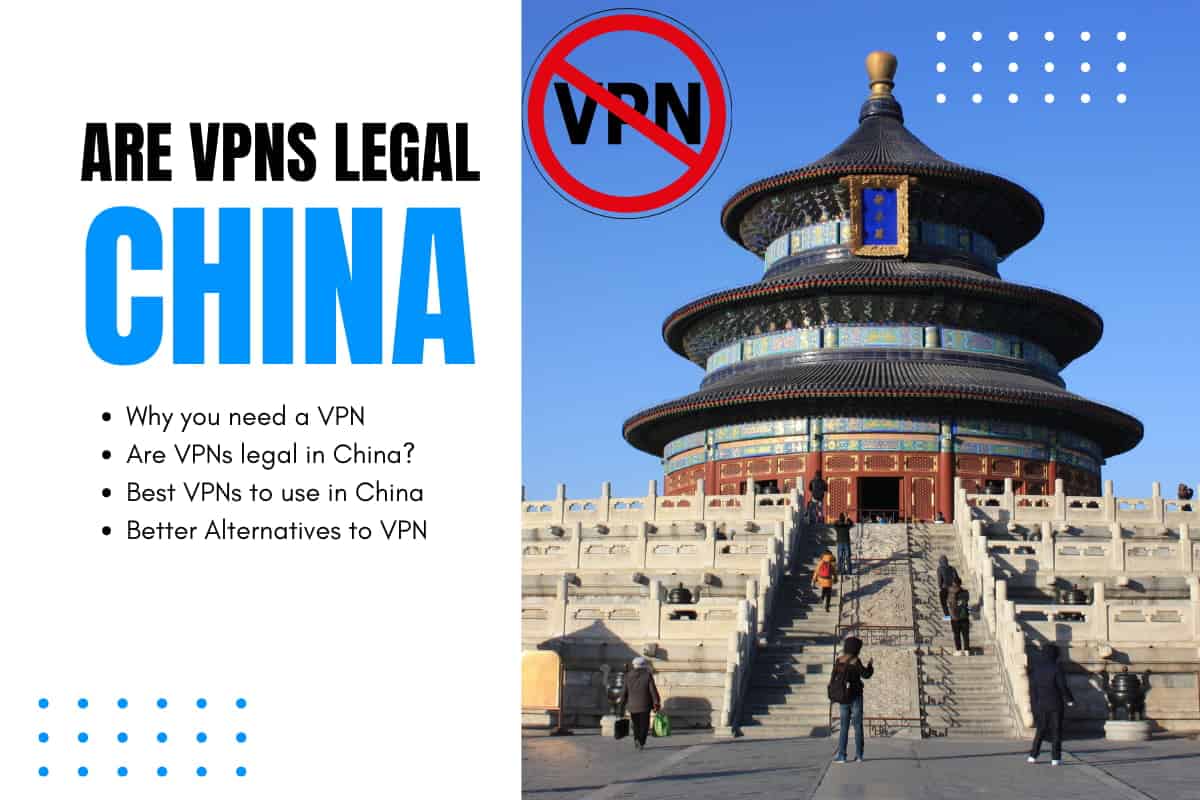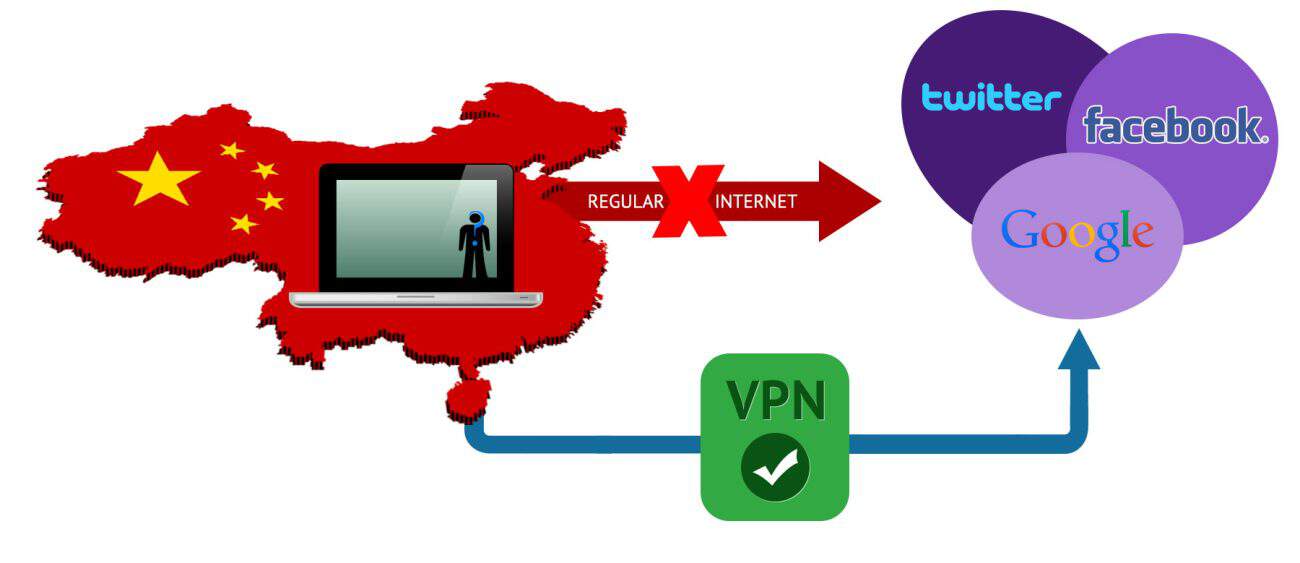When you shop for a travel eSIM or glance at your phone’s status bar, you will often see your phone show network types like “LTE”, “4G”, or sometimes even “5G”. Most people just assume it means “fast internet” and move on – which is fair enough, but there’s a bit more to it than that. […]
Are VPNs legal in China? Real Answer + Full Guide
China’s internet usage comes with a sophisticated system of censorship, which is often referred to as the “Great Firewall of China”. This system restricts users from accessing the free and open Internet. To bypass it, people use a virtual private network (VPN), but using a VPN in China is not as easy as it seems. While you can use a VPN in China, it does not mean the Chinese Government allows you to do it.
Are VPNs legal in China, truly? This article will give you the real answer to this question, and help you understand about using VPNs in China, from why the Chinese government block websites, what VPNs work, top providers, alternatives, if any.

In this article
I. Why do you need a VPN in China?
There are two main reasons to use a VPN in China:
- To bypass the Great Firewall: The Internet in China is controlled closely by the government. They use a system called the Great Firewall to control what information can enter or leave China through the Internet. This system prevents people within the country from accessing many well-known websites and social networks commonly used in other countries. By using a VPN, you can access blocked content, use social media platforms to stay in touch with people outside of China.
- To protect your online activities from being watched: In China, internet service providers and government agencies can monitor online activities. A VPN will encrypt your internet traffic, making it difficult for others to see what you are doing online. This encryption helps protect your privacy and personal information from potential surveillance or data collection.
II. Are VPNs legal in China?
Yes and No. The legality of VPNs in China is complex and not a simple yes or no question. The situation varies across different provinces in China, making it hard to give a definite answer for the entire country.
Ambiguity in Chinese laws regarding VPN use
Chinese laws and regulations do not explicitly prohibit VPN use. However, they do not clearly permit it either. This legal grey area allows authorities to interpret and enforce rules flexibly.
Also, the lack of clear legislation means that the situation can change rapidly, and users should stay informed about current practices and regulations.
Differences between personal and commercial VPN use
Chinese authorities treat personal and commercial VPN use differently.
Reports indicate that arrests for merely using VPNs in China are rare. This applies to both tourists and Chinese citizens.
However, the commercial use of VPNs is strictly regulated. Businesses must obtain government approval to use VPNs. Selling, providing or recommending non-government-approved VPN services online, especially on social media platforms, can result in legal issues.
III. What are Government-approved VPNs?
The Chinese Government does allow certain VPNs, primarily for business use. These are often referred to as government-approved or licensed VPNs, which are mainly intended for international companies operating in China to conduct business securely and access necessary oversea resources.
Should you use government-approved VPNs?
No, using a government-approved VPN in China is not recommended for personal privacy. These VPNs will likely log your data and share it with the Chinese Government.

IV. Will a free VPN service work in China?
No. You get what you pay for.
There is a fun fact that there are NO free VPN services that RELIABLY WORK in China. The Chinese government’s internet restrictions are sophisticated and constantly evolving, making it extremely difficult for free VPN services to bypass them.
In China, connecting to a VPN requires obfuscated servers (to hide VPN traffic and make it look like regular ones), and specialized connection protocols (to evade detection by China’s firewall). Free VPN services use basic encryption and connection methods which are easy to detect. Their connections often drop, causing you to be exposed online.
V. How to check if a website is blocked in China?
Chinese’s internet censorship affects many popular websites and applications used globally. Some of the major platforms that are blocked in China are:
- Social Media: Facebook, Instagram, Twitter, Snapchat
- Messaging: WhatsApp, Facebook Messenger
- Google Services: Gmail, Google Maps, Google Docs, Google Calendar
- Video Platforms: YouTube, Twitch
- News Outlets: BBC, CNN, Wall Street Journal, New York Times
- Information Sources: Wikipedia
- Productivity Tools: Slack
- Cloud Storage: OneDrive
- Music Streaming: Spotify
- Visual Discovery: Pinterest
- AI Chatbots: ChatGPT
For travelers and residents in China who need to access these services, using a VPN is often the most popular solution to bypass these restrictions.
To check which websites or platforms are blocked in China, you can:
- use online testing tools like Great Firewall of China Test,
- check the lists of blocked websites in China on major VPN providers,
- use proxy servers, or
- check official sources from Cyberspace Administration of China’s website (but the list is not always up-to-date).
► Learn How to find WiFi in China for travelers step by step
VI. What are the best VPNs to use in China?
Below is a quick list of the best VPN services in China:
- ExpressVPN
- PrivateVPN
- PureVPN
Below is a quick comparison table about these three VPN services:
1. ExpressVPN
ExpressVPN is the most expensive but offers the best overall performance and the largest server network. It is also the fastest VPN on the market.
- Rated as the best overall VPN for China
- Pricing: Starts at $6.67/month
- Server network: 100+ countries
- Obfuscation: Supported on all servers and protocols
- Speed: Fastest speeds on the market
- Security: Audited no-logs policy, full leak protection, perfect forward secrecy, RAM-only servers
- Ease of use: Super easy to use
- Money-back guarantee: 30 days
2. PureVPN
PureVPN focuses on advanced security features like Quantum-Resistant servers.
- Rated as a good security-focused China VPN
- Pricing: Starts at $2.11/month
- Server network: 6,000+ servers in 65+ countries
- Obfuscation: Supported on all servers, via OpenVPN and WireGuard
- Security: Audited no-logs policy, Quantum-Resistant servers, RAM-only servers, perfect forward secrecy
- Special features: Split-tunneling
- Money-back guarantee: 31 days
3. PrivateVPN
PrivateVPN is the most affordable and emphasizes ease of use for beginners. It is the
- Rated as a good China VPN for beginners
- Pricing: Starts at $2.00/month
- Server network: 200+ servers in 60+ countries
- Obfuscation: Supported via Stealth VPN feature
- Security: Strong leak protection, perfect forward secrecy
- Ease of use: Minimalist design, beginner-friendly
- Special features: Application Guard (app-based kill switch)
- Money-back guarantee: 30 days
VI. Can I bypass the Great Firewall without a VPN?
Yes, you can bypass the Great Firewall without a VPN by using alternatives, but some of them are not good. Here are best alternatives to VPN to access the Internet in China freely:
1. Use a proxy service – not recommended
It will change your IP address similarly to a VPN, but they do not provide encryption, so it merely does not provide any security.
2. Use Tor network – not recommended
It is a free privacy network that hides your IP address and encrypts your traffic similarly to a VPN. It adds multiple layers of encryption, meaning you will get added security. However, China’s Great Firewall still detects and blocks its servers easily.
3. Use Shadowsocks – work but inconvenient
It is a free encrypted proxy but rather inconvenient compared to VPNs. You need to access your own Shadowsocks server, which involves renting a virtual server outside of China. Then, manually deploy the Shadowsocks on the rented server. It is difficult and time consuming.
4. Use SIM cards / eSIMs with VPN included – work well and convenient
As a traveler to China, you can use tourist China SIM cards or eSIMs for China to access blocked websites and platforms without having to install a VPN.

To use them, your phone must be unlocked. Plus, if your phone is eSIM-supported, you can use China eSIMs for the most convenient. See the detailed list of eSIM compatible devices.
A China eSIM is a digital version of a physical China SIM card. It can be bought online, installed through scanning a QR code and activated automatically upon arrival.
You can choose from different eSIM plans to get the one that suits your needs and budget most.
VII. FAQs
Can I use a free VPN in China?
Yes, but it is not recommended to use a free VPN. They put your data at risk and have restrictive data caps as well as slow speeds. Instead, you should either use a paid VPN service or use SIM card/eSIMs as alternatives to VPN. They all allow you to access the blocked content in China without effort.
Does private Internet access work in China?
It may work, but not guaranteed. You can access blocked content in China now and then. Sometimes, it cannot bypass the Great Firewall. Consider other better alternatives on the market, like SIM cards/eSIMs.





